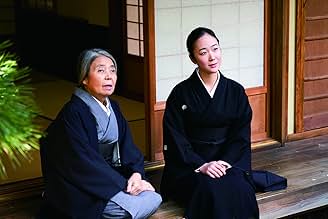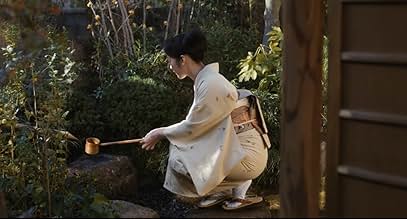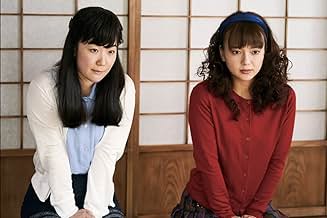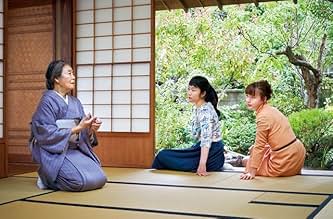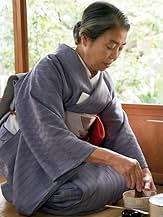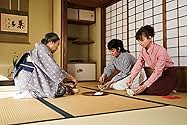NOTE IMDb
7,1/10
1,4 k
MA NOTE
Noriko et Michiko sont poussées par leurs parents vers l'art ancestral de la cérémonie du thé. Noriko découvre à travers ce rituel la saveur de l'instant présent alors que Michiko décide de ... Tout lireNoriko et Michiko sont poussées par leurs parents vers l'art ancestral de la cérémonie du thé. Noriko découvre à travers ce rituel la saveur de l'instant présent alors que Michiko décide de suivre un tout autre chemin.Noriko et Michiko sont poussées par leurs parents vers l'art ancestral de la cérémonie du thé. Noriko découvre à travers ce rituel la saveur de l'instant présent alors que Michiko décide de suivre un tout autre chemin.
- Réalisation
- Scénario
- Casting principal
- Récompenses
- 3 victoires et 2 nominations au total
Avis à la une
Nichi Nichi Kore Kojitsu - Every day a good day.
(100 minutes)
One Japanese college student - Noriko, who was about to graduate the following year, has always been viewed as dull and having little achievements in life, was once recommended by her mother to attend Chado class, learning about the traditional tea ceremony, not knowing that it would benefit a great deal and account for her sanctuary to pursue happiness one day.
The movie quite actually portrayed different areas of life throughout her bad days and her good days without focusing on them in accordance with the way of tea, but it unfolded them one event at a time for us to sense its purpose and to figure out how to polish self-awareness towards self-fulfilment.
Chado is a complex series of movements you can absorb very little from it if you overanalyze or to the contrary, overlook, too often. It's hard to learn by heart if your mind keeps asking why. Merely like how we form our perception, as a watcher, we would look at this tea drinking experience from the harmonious balance conducted between guest, host and natural surroundings; from accompanying elements such as the bowls, the sweets, or the wooden tea room's ink painting; but most satisfying above all, from the stillness in the nick of time between passing and arriving seasons. We would enjoy it to the fullest if we centralize ourselves in it.
It took Noriko 24 years later to genuinely understand the meaning of "Every day is a good day" but she was eventually able to have realized her dream.
One Japanese college student - Noriko, who was about to graduate the following year, has always been viewed as dull and having little achievements in life, was once recommended by her mother to attend Chado class, learning about the traditional tea ceremony, not knowing that it would benefit a great deal and account for her sanctuary to pursue happiness one day.
The movie quite actually portrayed different areas of life throughout her bad days and her good days without focusing on them in accordance with the way of tea, but it unfolded them one event at a time for us to sense its purpose and to figure out how to polish self-awareness towards self-fulfilment.
Chado is a complex series of movements you can absorb very little from it if you overanalyze or to the contrary, overlook, too often. It's hard to learn by heart if your mind keeps asking why. Merely like how we form our perception, as a watcher, we would look at this tea drinking experience from the harmonious balance conducted between guest, host and natural surroundings; from accompanying elements such as the bowls, the sweets, or the wooden tea room's ink painting; but most satisfying above all, from the stillness in the nick of time between passing and arriving seasons. We would enjoy it to the fullest if we centralize ourselves in it.
It took Noriko 24 years later to genuinely understand the meaning of "Every day is a good day" but she was eventually able to have realized her dream.
Movie is basically about a girl who went to college, and like a lot of us had all these dreams and aspirations, but things don't go her way. She ends up taking a green tea class mostly because there isn't anything to do, and she eventually finds herself spending the next 20+ years learning it.
She sees her friends move on in life, get married, but she has no luck.
It is a heartwarming movie with a bittersweet ending.
8/10.
She sees her friends move on in life, get married, but she has no luck.
It is a heartwarming movie with a bittersweet ending.
8/10.
Yes; comprehend Life is such a difficult thing but sometimes you are lucky and at some point some one suggest or show a way to the right Teacher that helps yo find a Path.
Little by little; takes time but is possible.
-Great camera work and shots. At first glance is a simple non sense plot but after the first 1/3 you start to see the Complexity onto all that apparent simplicity. All the little things count. Somehow I ended with sadness but is worth to watch.
-Great camera work and shots. At first glance is a simple non sense plot but after the first 1/3 you start to see the Complexity onto all that apparent simplicity. All the little things count. Somehow I ended with sadness but is worth to watch.
This movie is about accidentally finding out your passion in life, without knowing it. Sometimes you just do things because you want to try something new, and eventually it becomes your passion. This is a slow movie, but it does have some good acting and a few emotional scenes.
It is about a girl who finishes school but her perception of reality is false. She cannot find a job, her boyfriend leaves her, and she find slight happiness in the process of making and serving tea.
There are mostly actresses in this movie (I think there are only 2 - 3 actors). At least 80% of the movie takes place in the tea room, but because of the story it works. The story does move pretty fast, for example one scene takes place in a day, then the next scene just fast forwards a year later. It covers about 25 years of our main lady's life in under 2 hours, but that is not the important part. It is about how fast time moves, and how things change over time.
Anyways, it is a good film and we get to see a legendary Japanese actress one more time before her death.
8/10
It is about a girl who finishes school but her perception of reality is false. She cannot find a job, her boyfriend leaves her, and she find slight happiness in the process of making and serving tea.
There are mostly actresses in this movie (I think there are only 2 - 3 actors). At least 80% of the movie takes place in the tea room, but because of the story it works. The story does move pretty fast, for example one scene takes place in a day, then the next scene just fast forwards a year later. It covers about 25 years of our main lady's life in under 2 hours, but that is not the important part. It is about how fast time moves, and how things change over time.
Anyways, it is a good film and we get to see a legendary Japanese actress one more time before her death.
8/10
This was so relaxing, peaceful a graceful, yet carried some strong messages. Beautifully executed and directed. I will probably watch this again. Maybe even more than once more.
Le saviez-vous
- AnecdotesLead character repeats the same exact words about the Italian movie La Strada (1954) again and again.
- ConnexionsReferences La strada (1954)
Meilleurs choix
Connectez-vous pour évaluer et suivre la liste de favoris afin de recevoir des recommandations personnalisées
- How long is Every Day a Good Day?Alimenté par Alexa
Détails
- Date de sortie
- Pays d’origine
- Site officiel
- Langue
- Aussi connu sous le nom de
- Every Day a Good Day
- Sociétés de production
- Voir plus de crédits d'entreprise sur IMDbPro
Box-office
- Montant brut mondial
- 9 956 464 $US
- Durée
- 1h 40min(100 min)
- Couleur
- Rapport de forme
- 1.85 : 1
Contribuer à cette page
Suggérer une modification ou ajouter du contenu manquant

![Regarder Trailer [OV]](https://m.media-amazon.com/images/M/MV5BZTZkZTllZjctZTg0Mi00NjhhLWI5NzAtMmIyMTNkMTJmNDQxXkEyXkFqcGdeQXRyYW5zY29kZS13b3JrZmxvdw@@._V1_QL75_UX500_CR0)
